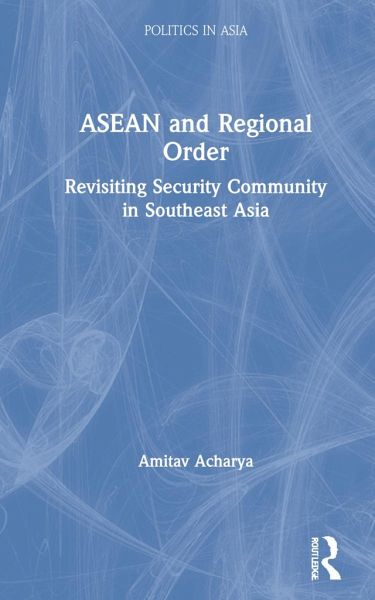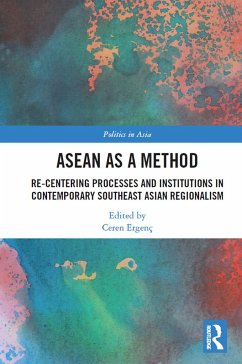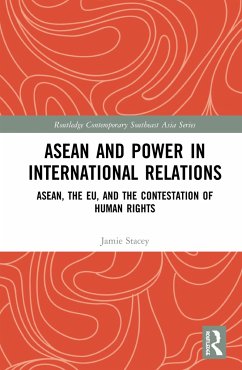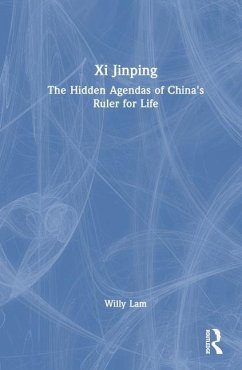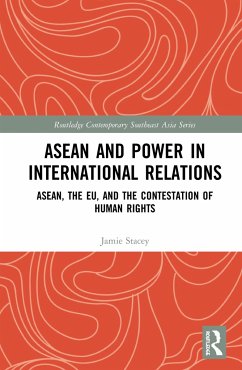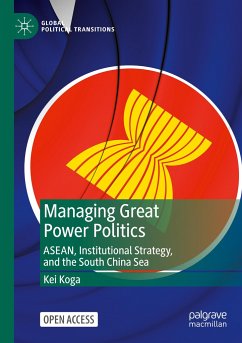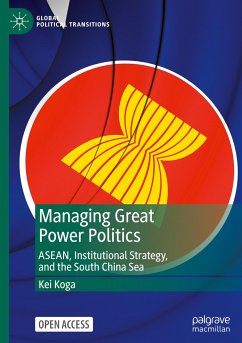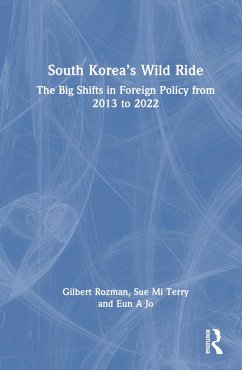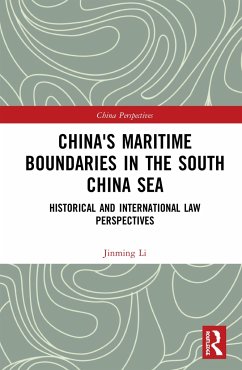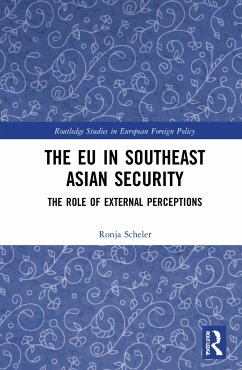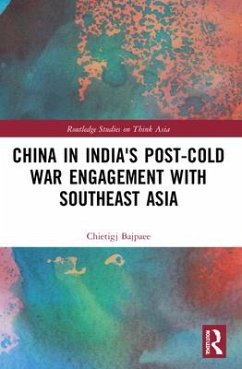Amitav Acharya
Gebundenes Buch
ASEAN and Regional Order
Revisiting Security Community in Southeast Asia
Versandkostenfrei!
Versandfertig in 1-2 Wochen
Weitere Ausgaben:

PAYBACK Punkte
84 °P sammeln!





Founded in 1967, the Association of Southeast Asian Nations (ASEAN) has emerged as one of the most successful regional organisations in the world. This book discusses the future of ASEAN against a backdrop of a growing US-China rivalry and the security implications of COVID-19.
Amitav Acharya is the UNESCO Chair in Transnational Challenges and Governance and Distinguished Professor at the School of International Service, American University, Washington, DC. He is also the Chair of the ASEAN Studies Initiative at American University. He is an Honorary Professor at Rhodes University, South Africa. Previously he taught at York University, Toronto, University of Bristol, and Nanyang Technological University, Singapore. He also held the inaugural Boeing Company Chair in International Relations at the Schwarzman Scholars Program at Tsinghua University in 2016-18 and was elected to the Christensen Fellowship at Oxford. Among his major works on Southeast Asia are Constructing a Security Community in Southeast Asia: ASEAN and the Problems of Regional Order (3rd edition, 2014), The Making of Southeast Asia (2013), Whose Ideas Matter?: Agency and Power in Asian Regionalism (2009), and East of India, South of China: Sino- Indian Encounters in Southeast Asia (2017). He is the first non-Western scholar to be elected as the President of the International Studies Association (ISA), the most respected and influential global network of scholars in International Relations. He is the recipient of two Distinguished Scholar Awards from the ISA for his scholarship and contributions to international relations theory in the Global South (2015) and the study of international organizations and global governance (2018).
Produktdetails
- Verlag: Routledge
- Seitenzahl: 158
- Erscheinungstermin: 31. Mai 2021
- Englisch
- Abmessung: 222mm x 145mm x 12mm
- Gewicht: 339g
- ISBN-13: 9780367641511
- ISBN-10: 0367641518
- Artikelnr.: 62185765
Herstellerkennzeichnung
Libri GmbH
Europaallee 1
36244 Bad Hersfeld
gpsr@libri.de
Reviews of Amitav Acharya's Constructing a Security Community in Southeast Asia
"Anyone seeking to find the link between the power of intellectual discourse and policy relevance should read this book. The ASEAN Security Community (ASC), first as a discourse and subsequently as a policy adopted by ASEAN, has to a considerable degree been inspired by the arguments advanced in this book." - Rizal Sukma, Deputy Executive Director, Centre for Strategic and International Studies, Jakarta
"Constructing a Security Community in Southeast Asia is the best constructivist analysis of regionalism written to date. It offers an enlightening application of constructivism to a fascinating case study, which is
"Anyone seeking to find the link between the power of intellectual discourse and policy relevance should read this book. The ASEAN Security Community (ASC), first as a discourse and subsequently as a policy adopted by ASEAN, has to a considerable degree been inspired by the arguments advanced in this book." - Rizal Sukma, Deputy Executive Director, Centre for Strategic and International Studies, Jakarta
"Constructing a Security Community in Southeast Asia is the best constructivist analysis of regionalism written to date. It offers an enlightening application of constructivism to a fascinating case study, which is
Mehr anzeigen
very helpful for graduate studies and young scholars like me, who are interested in the operationalisation of constructivist approaches to analyse state action and the unfolding of regionalism." - Germán C. Prieto, Universidad Javeriana, Columbia
"This ground-breaking study illuminates brilliantly ASEAN's novel approach to issues of national and international security. Theoretically sophisticated and contextually grounded, Amitav Acharya is the rare scholar who succeeds fully in engaging intellectually both security and area specialists." - Peter J. Katzenstein, Cornell University, USA
"...innovative and stimulating...the theoretical and empirical sophistication that Acharya displays makes this book sure to be a key work on the security and political aspects of ASEAN for academics and policymakers...a vivid and cutting-edge work" - American Political Science Review
"...a wise book... the author expresses judgments that challenge analysts in Southeast Asia itself to consider seriously what can be done to chart a new course for the region." - Journal of Asian Studies
"Acharya's book stands as a major contribution to the ongoing Asian security debate and contributes substantially to the quality of that debate's policy analysis." - Survival
"an invaluable resource for every student of the region." - Pacific Affairs
"...a fascinating and important book...Regional specialists will find a great deal to mull over in this nuanced and compelling analysis." - Pacific Review
"Constructing a security community in Southeast Asia is a ground-breaking work and an important landmark for the study of regional and international security." - Alessandro Uras, Journal of International and Global Studies Volume 7, Number 1, 106-108.
"Regarding ASEAN and Southeast Asian regional studies Constructing a Security Community in Southeast Asia: ASEAN and the Problem of Regional Order is a must read for scholars and students. It is well researched and is accessible to readers of wide variety." - East Asia Integration Studies
"This ground-breaking study illuminates brilliantly ASEAN's novel approach to issues of national and international security. Theoretically sophisticated and contextually grounded, Amitav Acharya is the rare scholar who succeeds fully in engaging intellectually both security and area specialists." - Peter J. Katzenstein, Cornell University, USA
"...innovative and stimulating...the theoretical and empirical sophistication that Acharya displays makes this book sure to be a key work on the security and political aspects of ASEAN for academics and policymakers...a vivid and cutting-edge work" - American Political Science Review
"...a wise book... the author expresses judgments that challenge analysts in Southeast Asia itself to consider seriously what can be done to chart a new course for the region." - Journal of Asian Studies
"Acharya's book stands as a major contribution to the ongoing Asian security debate and contributes substantially to the quality of that debate's policy analysis." - Survival
"an invaluable resource for every student of the region." - Pacific Affairs
"...a fascinating and important book...Regional specialists will find a great deal to mull over in this nuanced and compelling analysis." - Pacific Review
"Constructing a security community in Southeast Asia is a ground-breaking work and an important landmark for the study of regional and international security." - Alessandro Uras, Journal of International and Global Studies Volume 7, Number 1, 106-108.
"Regarding ASEAN and Southeast Asian regional studies Constructing a Security Community in Southeast Asia: ASEAN and the Problem of Regional Order is a must read for scholars and students. It is well researched and is accessible to readers of wide variety." - East Asia Integration Studies
Schließen
Für dieses Produkt wurde noch keine Bewertung abgegeben. Wir würden uns sehr freuen, wenn du die erste Bewertung schreibst!
Eine Bewertung schreiben
Eine Bewertung schreiben
Andere Kunden interessierten sich für




